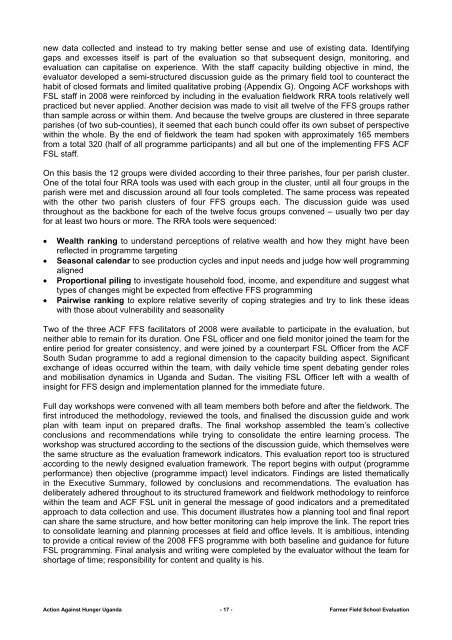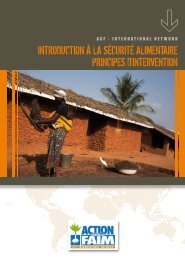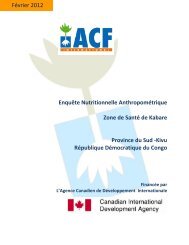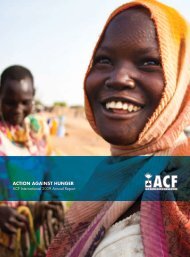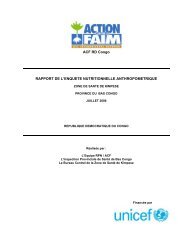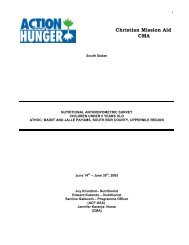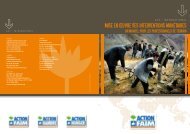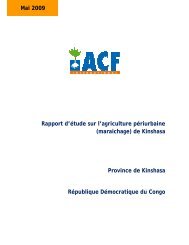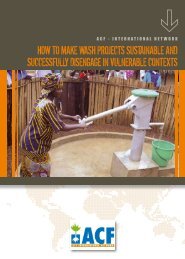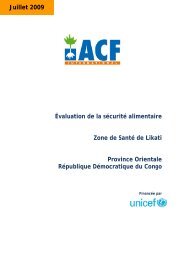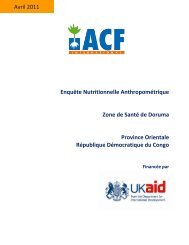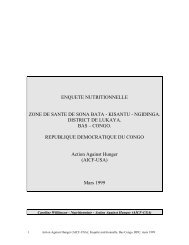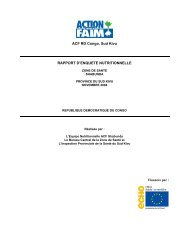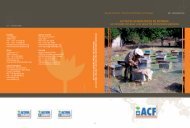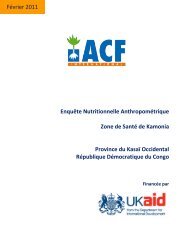Participatory Evaluation of our 2008 - Action Against Hunger
Participatory Evaluation of our 2008 - Action Against Hunger
Participatory Evaluation of our 2008 - Action Against Hunger
Create successful ePaper yourself
Turn your PDF publications into a flip-book with our unique Google optimized e-Paper software.
new data collected and instead to try making better sense and use <strong>of</strong> existing data. Identifying<br />
gaps and excesses itself is part <strong>of</strong> the evaluation so that subsequent design, monitoring, and<br />
evaluation can capitalise on experience. With the staff capacity building objective in mind, the<br />
evaluator developed a semi-structured discussion guide as the primary field tool to counteract the<br />
habit <strong>of</strong> closed formats and limited qualitative probing (Appendix G). Ongoing ACF workshops with<br />
FSL staff in <strong>2008</strong> were reinforced by including in the evaluation fieldwork RRA tools relatively well<br />
practiced but never applied. Another decision was made to visit all twelve <strong>of</strong> the FFS groups rather<br />
than sample across or within them. And because the twelve groups are clustered in three separate<br />
parishes (<strong>of</strong> two sub-counties), it seemed that each bunch could <strong>of</strong>fer its own subset <strong>of</strong> perspective<br />
within the whole. By the end <strong>of</strong> fieldwork the team had spoken with approximately 165 members<br />
from a total 320 (half <strong>of</strong> all programme participants) and all but one <strong>of</strong> the implementing FFS ACF<br />
FSL staff.<br />
On this basis the 12 groups were divided according to their three parishes, f<strong>our</strong> per parish cluster.<br />
One <strong>of</strong> the total f<strong>our</strong> RRA tools was used with each group in the cluster, until all f<strong>our</strong> groups in the<br />
parish were met and discussion around all f<strong>our</strong> tools completed. The same process was repeated<br />
with the other two parish clusters <strong>of</strong> f<strong>our</strong> FFS groups each. The discussion guide was used<br />
throughout as the backbone for each <strong>of</strong> the twelve focus groups convened – usually two per day<br />
for at least two h<strong>our</strong>s or more. The RRA tools were sequenced:<br />
• Wealth ranking to understand perceptions <strong>of</strong> relative wealth and how they might have been<br />
reflected in programme targeting<br />
• Seasonal calendar to see production cycles and input needs and judge how well programming<br />
aligned<br />
• Proportional piling to investigate household food, income, and expenditure and suggest what<br />
types <strong>of</strong> changes might be expected from effective FFS programming<br />
• Pairwise ranking to explore relative severity <strong>of</strong> coping strategies and try to link these ideas<br />
with those about vulnerability and seasonality<br />
Two <strong>of</strong> the three ACF FFS facilitators <strong>of</strong> <strong>2008</strong> were available to participate in the evaluation, but<br />
neither able to remain for its duration. One FSL <strong>of</strong>ficer and one field monitor joined the team for the<br />
entire period for greater consistency, and were joined by a counterpart FSL Officer from the ACF<br />
South Sudan programme to add a regional dimension to the capacity building aspect. Significant<br />
exchange <strong>of</strong> ideas occurred within the team, with daily vehicle time spent debating gender roles<br />
and mobilisation dynamics in Uganda and Sudan. The visiting FSL Officer left with a wealth <strong>of</strong><br />
insight for FFS design and implementation planned for the immediate future.<br />
Full day workshops were convened with all team members both before and after the fieldwork. The<br />
first introduced the methodology, reviewed the tools, and finalised the discussion guide and work<br />
plan with team input on prepared drafts. The final workshop assembled the team’s collective<br />
conclusions and recommendations while trying to consolidate the entire learning process. The<br />
workshop was structured according to the sections <strong>of</strong> the discussion guide, which themselves were<br />
the same structure as the evaluation framework indicators. This evaluation report too is structured<br />
according to the newly designed evaluation framework. The report begins with output (programme<br />
performance) then objective (programme impact) level indicators. Findings are listed thematically<br />
in the Executive Summary, followed by conclusions and recommendations. The evaluation has<br />
deliberately adhered throughout to its structured framework and fieldwork methodology to reinforce<br />
within the team and ACF FSL unit in general the message <strong>of</strong> good indicators and a premeditated<br />
approach to data collection and use. This document illustrates how a planning tool and final report<br />
can share the same structure, and how better monitoring can help improve the link. The report tries<br />
to consolidate learning and planning processes at field and <strong>of</strong>fice levels. It is ambitious, intending<br />
to provide a critical review <strong>of</strong> the <strong>2008</strong> FFS programme with both baseline and guidance for future<br />
FSL programming. Final analysis and writing were completed by the evaluator without the team for<br />
shortage <strong>of</strong> time; responsibility for content and quality is his.<br />
<strong>Action</strong> <strong>Against</strong> <strong>Hunger</strong> Uganda - 17 - Farmer Field School <strong>Evaluation</strong>


